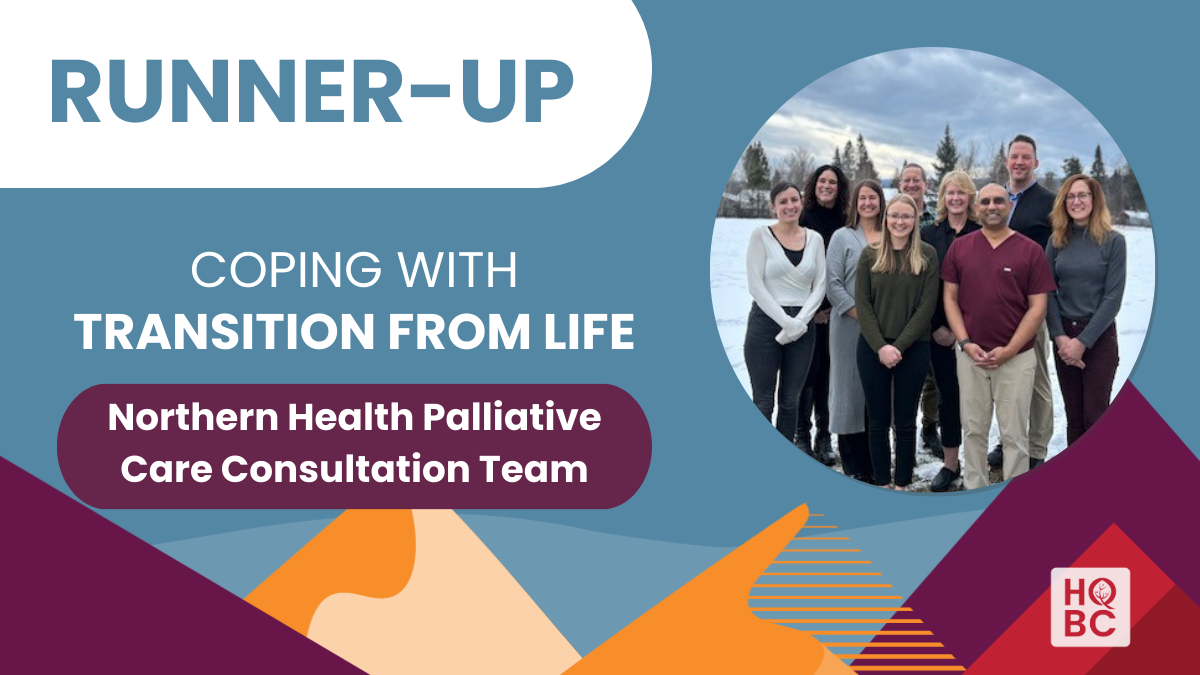- 2024
|
- Runner-Up
|
- Coping with Transition from Life
Palliative and end-of-life care can vary in duration and aren’t always closely linked in time. People may receive palliative care for extended periods – even years – or briefly before entering remission.
This is where Northern Health’s “small but mighty”1 Palliative Care Consultation Team comes in. They support both palliative and end-of-life care, and they view it as a privilege.
“For patients and their families, it’s the most difficult time in their lives,” says team member Jennifer Ferguson, a palliative care nurse consultant. “We feel really honoured to be invited into that space to be with them on their journey; it’s a very sacred time.”
Adds fellow team member Jennifer Krzyczkowski, also a palliative care nurse consultant: “Every day I come to work I try to make a difference in the lives of others, and I do everything in my power to ensure the patient has a peaceful death. I can’t change the terminal diagnosis, but I can do my very best to ensure symptoms are well managed and the patient has a peaceful death.”
The Northern Health (NH) Palliative Care Consultation Team works with primary care providers across the North, supporting them to ensure effective palliative and end-of-life care. It consists of a regional lead, six registered nurses with speciality training, a pharmacist lead, an administrative assistant, three physicians and a physician lead. Together, they build capacity among primary care providers in all care settings, provide consultations for complex palliative care patients, share resources on palliative and end-of-life care (physical, psychological, social, and spiritual), and develop evidence-based resources.
Through it all, the team provides care with the person and family at the centre. It means that palliative care in NH is more consistent, accessible, and equitable than ever before.
In the words of Inban Reddy, the team’s physician lead, “Before the team was created, we had pockets of excellence, but there was no formalized structure or strategy for the delivery of palliative care.”
As Canada’s population ages, chronic diseases are being managed for longer than ever before: Health Canada estimates that 37% of seniors (age 60+) have two or more chronic diseases2. For these individuals, a palliative approach improves quality of life and also increases life expectancy3. Through the work of the team, NH can better manage and support individuals with chronic conditions.
Before the team’s inception in 2012, palliative patients often presented to acute care for pain or symptom management. “But if we can be in touch and consult with primary care providers in the community,” says Jennifer Ferguson, “we can often prevent admissions and keep people at home in their community instead of in the hospital.”
Regional Lead Stacey Joyce concurs: “By doing consultations with care providers, we help ease pressure on acute care,” she says.
Other BC health authorities use a specialist care model, caring directly for palliative patients. In contrast, NH approached palliative care as primary care supported by specialist consultation.
“It was groundbreaking,” says Inban. “Now the other health authorities are trying to follow what we started.”
Collaboration, engagement, and quality are the hallmarks of the team’s work. They have worked with partners including the First Nations Health Authority (FNHA), Carrier Sekani Family Services, Pallium Canada, Life and Death Matters, Victoria Hospice, and the BC Cancer Centre for the North. In addition, they have expanded their support to First Nations and rural/remote communities using iPads purchased in partnership with the FNHA, and a cell booster purchased collaboratively with BC Cancer.
In 2017, the team was honoured to support a team of health care providers to win an award4 for quality palliative care in the remote village of Lax Kwa’alams, accessible only by water.
As a clinician, palliative care nurse consultant Seth Gysbers says this is meaningful work.
“It enables me to support people and those that provide care to people during one of their most difficult times in their life,” says Seth. “This role has allowed me to support clinicians through mentorship and education in developing their own skills and confidence in managing care for people receiving palliative care, which ultimately does lead to better outcomes in terms of the quality of life while clients face the challenges associated with advanced disease.”


